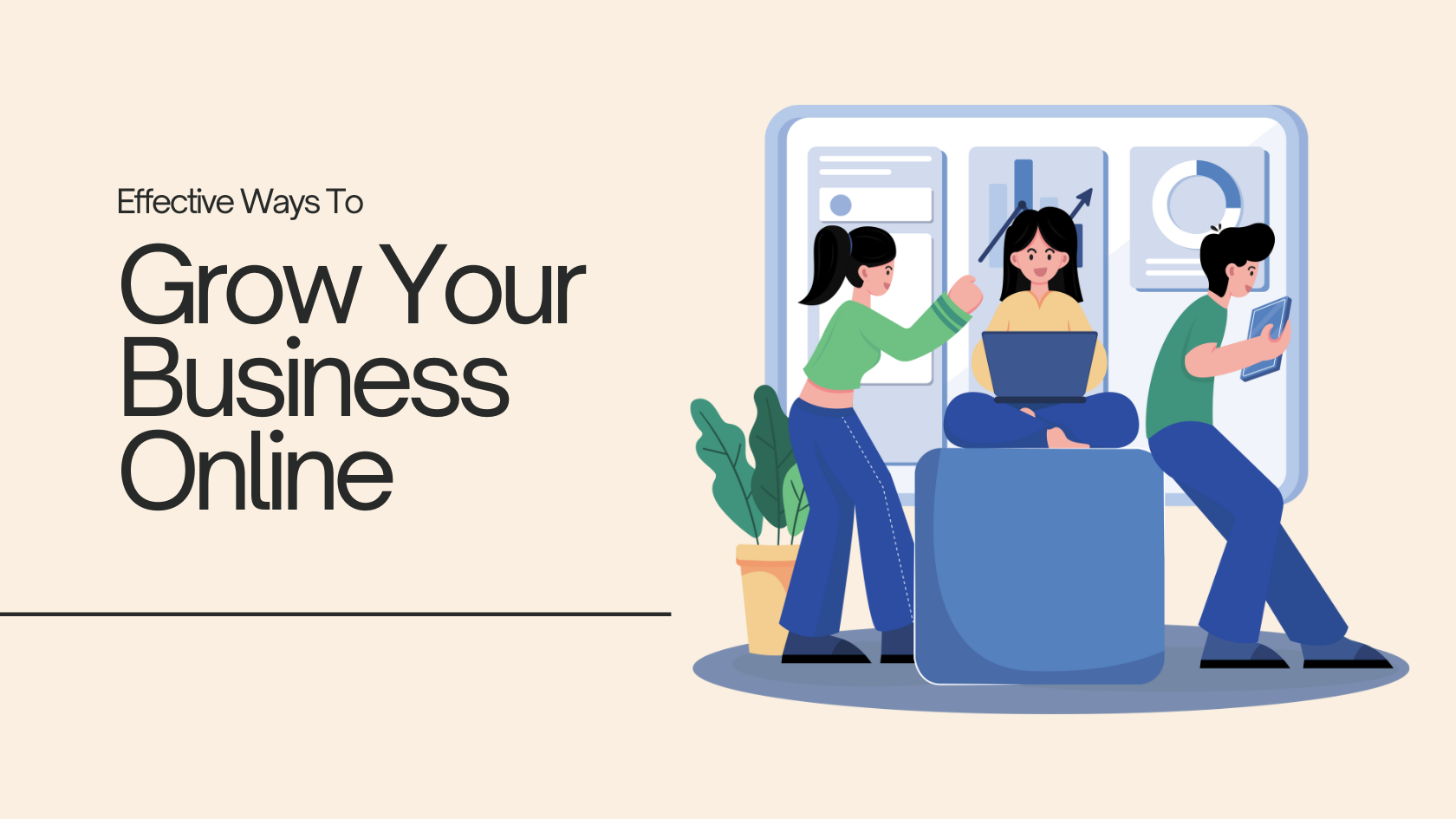Introduction
Growing your business online is no longer optional in 2025 — it’s a necessity. With millions of users spending hours online daily, the internet offers an unparalleled platform to reach new audiences, enhance brand recognition, and drive revenue. Businesses that adapt to the digital space not only survive but thrive, leveraging tools and strategies that deliver measurable success.
In this article, we’ll explore proven techniques to help grow your business online, ensuring you stay competitive and ahead of the curve.
Outline
| Heading | Details |
|---|---|
| Why Your Business Needs an Online Presence | Discussing the benefits and the necessity of having an online presence |
| Understanding Your Target Audience | Strategies to identify and engage your target audience |
| Building a User-Friendly Website | Key elements to consider when designing or optimizing your website |
| Leveraging Search Engine Optimization (SEO) | Practical SEO strategies for increasing online visibility |
| Content Marketing for Online Growth | How blogging, videos, and other content can attract and retain customers |
| Social Media Strategies for Business Growth | Utilizing social platforms to boost engagement and conversions |
| Email Marketing as a Growth Tool | Building and nurturing relationships through email campaigns |
| Pay-Per-Click Advertising (PPC) | How paid ads can drive traffic and generate leads |
| Affiliate Marketing for Online Expansion | Leveraging partnerships for mutual growth |
| Utilizing Analytics to Track Growth | Tools and techniques for analyzing website and campaign performance |
| Online Reputation Management | Tips for maintaining a positive online image |
| Customer Service in the Digital Age | Importance of quick, reliable, and personalized customer service online |
| The Power of Influencer Marketing | Partnering with influencers to amplify brand reach |
| Future-Proofing Your Online Business | Staying updated with trends and adapting to future challenges |
| FAQs | Addressing common questions about growing a business online |
| Conclusion | Summarizing actionable steps and encouraging implementation |
Why Your Business Needs an Online Presence in 2025 and Beyond
With ever growing Internet user base, the digital marketplace is where customers are searching, shopping, and engaging with brands. Having an online presence ensures that you’re discoverable when potential customers are looking for services or products you offer.
Some key benefits include:
- Global Reach: Expand beyond your local audience.
- Cost-Effective Marketing: Online strategies often cost less than traditional methods.
- Enhanced Credibility: A professional online presence builds trust.
- 24/7 Accessibility: Your business works even when you don’t.
Without an online presence, you risk losing customers to competitors who are more visible and accessible.
Understanding Your Target Audience
Knowing your target audience is the cornerstone to grow your business online. After all, you can’t market effectively without understanding who you’re trying to reach.
How to Identify Your Target Audience:
- Analyze Your Current Customers: What are their demographics, interests, and purchasing behaviors?
- Use Online Tools: Platforms like Google Analytics and social media insights can reveal valuable data about your audience.
- Engage Directly: Surveys, polls, and feedback forms can help you gain first-hand knowledge.
Once you have a clear picture of your audience, tailor your content, products, and services to meet their needs and solve their pain points. Personalization drives engagement, which translates to loyalty and growth.
Building a User-Friendly Website
Your website is your digital storefront. A well-designed, user-friendly site ensures visitors stay longer and are more likely to convert into customers.
Key Elements of a Great Website:
- Clear Navigation: Make it easy for users to find what they’re looking for.
- Fast Loading Speed: A delay of even a few seconds can lead to lost customers.
- Mobile Responsiveness: With most users browsing on mobile devices, optimization is critical.
- Compelling Content: Use visuals, text, and calls-to-action (CTAs) that resonate with your audience.
- Secure Transactions: If applicable, integrate SSL certificates and secure payment gateways.
An intuitive, aesthetically pleasing website enhances user experience, builds trust, and boosts conversion rates ultimately helping to grow your business online.
Leveraging Search Engine Optimization (SEO)
SEO is the backbone of online visibility. Without it, even the best content can go unnoticed.
Basic SEO Practices to Get Started:
- Keyword Research: Use tools like Ahrefs or SEMrush to find relevant keywords for your business.
- On-Page Optimization: Optimize titles, meta descriptions, headers, and content with target keywords.
- Backlink Strategy: Build quality links from reputable websites to boost your domain authority.
- Local SEO: For location-based businesses, focus on local keywords and optimize your Google My Business profile.
- Content Freshness: Regularly update your site with high-quality, relevant content.
These practices not only help your website rank higher in search results but also improve user experience and engagement.
Content Marketing for Online Growth
Content marketing is a powerful tool to attract, engage, and retain your audience. By offering valuable information, you establish authority and build trust with your customers.
Effective Content Types for Business Growth:
- Blogs: Share insights, tips, and updates related to your industry.
- Videos: Tutorials, behind-the-scenes content, and product demos are highly engaging.
- Infographics: Visual representations of data are more shareable and easier to digest.
- E-books and Guides: Long-form content can position your business as an expert.
The key is to create content that addresses your audience’s questions, needs, or pain points, encouraging them to return to your platform repeatedly.
Social Media Strategies To Grow Your Business Online
Social media platforms are invaluable for connecting with your audience, promoting products, and driving traffic to your website.
Best Practices for Social Media Success:
- Choose the Right Platforms: Focus on where your target audience is most active.
- Consistent Branding: Use consistent visuals, tone, and messaging across platforms.
- Engage Regularly: Respond to comments, participate in discussions, and post frequently.
- Leverage Ads: Social media ads can target specific demographics with pinpoint accuracy.
- Collaborate with Influencers: Partnering with relevant influencers can amplify your reach.
An active and engaging social media presence strengthens brand recognition and fosters a sense of community around your business.
Email Marketing as a Growth Tool
Email marketing remains one of the most effective ways to nurture leads and build lasting relationships with customers.
Steps to Build a Successful Email Campaign:
- Grow Your Email List: Use lead magnets like free guides or discounts.
- Segment Your Audience: Send tailored content to different groups for better engagement.
- Craft Engaging Subject Lines: Grab attention immediately to boost open rates.
- Include Strong CTAs: Encourage recipients to take the next step, whether it’s visiting your website or making a purchase.
- Automate Follow-Ups: Use tools like Mailchimp or HubSpot to streamline processes.
With the right strategy, email campaigns can drive traffic, boost conversions, and strengthen customer loyalty and take you one step to grow your business online.
Pay-Per-Click Advertising (PPC)
PPC campaigns can provide immediate results by driving targeted traffic to your website. Platforms like Google Ads and Facebook Ads allow you to control your budget and audience.
How to Run Effective PPC Campaigns:
- Set Clear Goals: Define whether you’re aiming for traffic, leads, or sales.
- Choose Relevant Keywords: Bid on terms that potential customers are searching for.
- Create Compelling Ad Copy: Highlight your unique selling points to attract clicks.
- Monitor Performance: Regularly assess metrics like click-through rate (CTR) and conversion rate to optimize campaigns.
Although PPC requires a financial investment, the ROI can be substantial when campaigns are managed effectively.
Affiliate Marketing To Grow Your Business Online
Affiliate marketing is a cost-effective strategy that allows you to collaborate with affiliates who promote your products or services. You pay them a commission for every sale or lead they generate, making it a win-win for both parties.
How to Start an Affiliate Program:
- Define Your Goals: Decide whether you aim to increase sales, leads, or brand awareness.
- Choose the Right Platform: Use tools like ShareASale, CJ Affiliate, or in-house software to manage affiliates.
- Attract Affiliates: Offer competitive commissions and provide promotional materials like banners and email templates.
- Track Performance: Use analytics to monitor which affiliates drive the most traffic or sales.
Affiliate marketing is particularly effective for e-commerce and digital products, providing an additional revenue stream without significant upfront investment.
Utilizing Analytics to Track Growth
Analytics provide valuable insights into how users interact with your website and marketing campaigns. Data-driven decisions lead to better outcomes and higher ROI.
Top Analytics Tools for Businesses:
- Google Analytics: Comprehensive data on traffic sources, user behavior, and conversions.
- SEMRush: Insights into your SEO performance and competitors’ strategies.
- Hotjar: Heatmaps and session recordings to analyze user interaction.
- HubSpot: A complete CRM and analytics solution for marketing and sales.
Regularly reviewing analytics helps you identify strengths, weaknesses, and opportunities for improvement.
Online Reputation Management
Your online reputation can make or break your business. Positive reviews and testimonials build trust, while negative feedback needs to be addressed promptly.
Tips for Managing Your Online Reputation:
- Monitor Mentions: Use tools like Google Alerts to track what’s being said about your brand.
- Encourage Reviews: Ask satisfied customers to leave reviews on Google, Yelp, or social media.
- Respond Professionally: Handle negative feedback with empathy and a solution-oriented approach.
- Showcase Testimonials: Highlight positive feedback on your website and marketing materials.
Maintaining a strong online reputation builds customer trust and encourages loyalty.
Customer Service in the Digital Age
Providing exceptional customer service online is key to retaining customers and building a positive brand image.
Ways to Enhance Online Customer Service:
- Live Chat Support: Offer instant assistance through chat widgets on your website.
- Automated Responses: Use chatbots for common queries to improve response time.
- Social Media Engagement: Address customer inquiries and complaints on platforms like Twitter or Facebook.
- Comprehensive FAQs: Include detailed answers to frequently asked questions on your site.
Great customer service differentiates your brand and fosters long-term relationships.
The Power of Influencer Marketing
Influencer marketing leverages the reach and credibility of individuals with large social media followings. Collaborating with the right influencers can exponentially increase your brand’s visibility and help grow your business online.
How to Execute an Influencer Marketing Campaign:
- Find the Right Influencers: Use platforms like Upfluence or manually research niche influencers.
- Set Clear Objectives: Define goals such as brand awareness, traffic, or sales.
- Provide Creative Freedom: Allow influencers to craft authentic content that aligns with your brand.
- Measure Results: Track performance metrics like engagement rates, clicks, and conversions.
When done right, influencer marketing can boost your online presence and credibility significantly.
Future-Proofing Your Online Business
The online landscape evolves rapidly, and staying ahead of trends ensures long-term success.
Tips to Future-Proof Your Business:
- Stay Informed: Follow industry news and digital marketing blogs.
- Invest in Training: Equip your team with the latest skills and tools.
- Adopt Emerging Technologies: Explore AI, AR, or blockchain applications for your business.
- Test and Adapt: Continuously test strategies and pivot based on results.
A proactive approach helps you remain competitive and relevant in an ever-changing digital world.
Conclusion
Growing your business online is a journey that requires strategy, dedication, and adaptability. By building a solid online presence, leveraging tools like SEO and content marketing, and maintaining meaningful connections with your audience, you can achieve sustainable growth in the digital space.
Take the first step today—an optimized online strategy is within your reach.
FAQs
What are the key steps to grow a business online?
- Build a user-friendly website, utilize SEO, create quality content, and engage on social media.
How important is SEO for online business growth?
- SEO is critical as it helps your website rank higher on search engines, increasing visibility and traffic.
What are some effective content marketing strategies?
- Blogs, videos, infographics, and e-books tailored to your audience’s needs work best.
Why should businesses invest in email marketing?
- Email marketing helps build relationships, nurture leads, and drive conversions.
How can social media help grow a business online?
- Social media fosters engagement, increases brand awareness, and drives traffic to your website.
Is PPC advertising worth the investment?
- Yes, PPC provides immediate results, targeted traffic, and measurable ROI when managed correctly.







